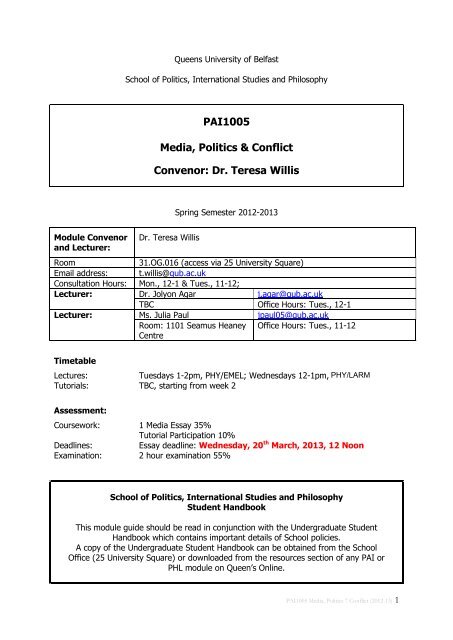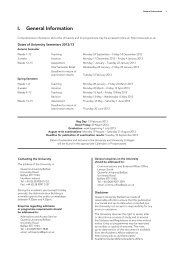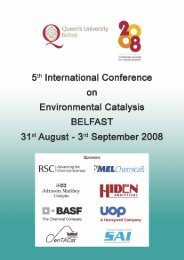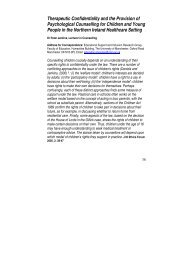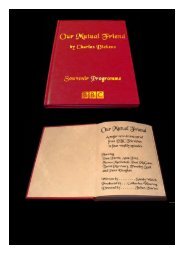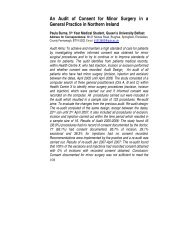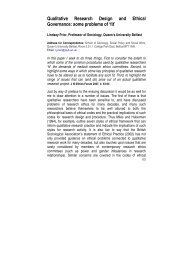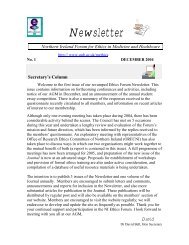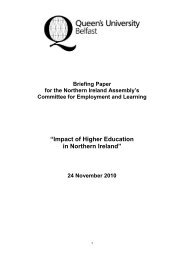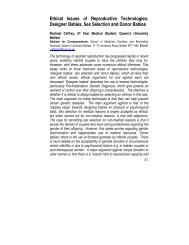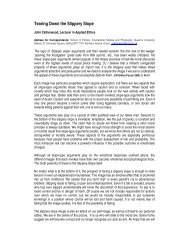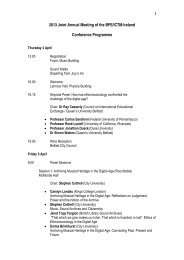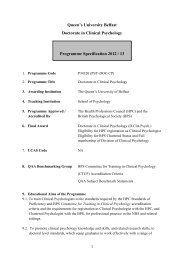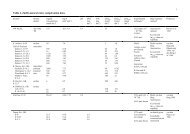Media, Politics & Conflict - Queen's University Belfast
Media, Politics & Conflict - Queen's University Belfast
Media, Politics & Conflict - Queen's University Belfast
Create successful ePaper yourself
Turn your PDF publications into a flip-book with our unique Google optimized e-Paper software.
Queens <strong>University</strong> of <strong>Belfast</strong><br />
School of <strong>Politics</strong>, International Studies and Philosophy<br />
PAI1005<br />
<strong>Media</strong>, <strong>Politics</strong> & <strong>Conflict</strong><br />
Convenor: Dr. Teresa Willis<br />
Spring Semester 2012-2013<br />
Module Convenor<br />
and Lecturer:<br />
Dr. Teresa Willis<br />
Room<br />
31.OG.016 (access via 25 <strong>University</strong> Square)<br />
Email address: t.willis@qub.ac.uk<br />
Consultation Hours: Mon., 12-1 & Tues., 11-12;<br />
Lecturer: Dr. Jolyon Agar j.agar@qub.ac.uk<br />
TBC Office Hours: Tues., 12-1<br />
Lecturer: Ms. Julia Paul jpaul05@qub.ac.uk<br />
Room: 1101 Seamus Heaney<br />
Centre<br />
Office Hours: Tues., 11-12<br />
Timetable<br />
Lectures:<br />
Tuesdays 1-2pm, PHY/EMEL; Wednesdays 12-1pm, PHY/LARM PHY/EMEL<br />
Tutorials: TBC, starting from week 2<br />
Assessment:<br />
Coursework: 1 <strong>Media</strong> Essay 35%<br />
Tutorial Participation 10%<br />
Deadlines:<br />
Essay deadline: Wednesday, 20 th March, 2013, 12 Noon<br />
Examination: 2 hour examination 55%<br />
School of <strong>Politics</strong>, International Studies and Philosophy<br />
Student Handbook<br />
This module guide should be read in conjunction with the Undergraduate Student<br />
Handbook which contains important details of School policies.<br />
A copy of the Undergraduate Student Handbook can be obtained from the School<br />
Office (25 <strong>University</strong> Square) or downloaded from the resources section of any PAI or<br />
PHL module on Queen’s Online.<br />
PAI1005 <strong>Media</strong>, <strong>Politics</strong> 7 <strong>Conflict</strong> (2012-13) 1
MODULE DESCRIPTION<br />
The module examines the nature of politics and conflict in media driven culture. It explores<br />
the relationship between media and democracy in times of war, and asks questions about<br />
bias, agenda setting, power and control in the media. It covers both local and global politics,<br />
and provides the historical context for significant technological developments (e.g. the<br />
internet) and contemporary examples of the growing power of the media (e.g. the CNN<br />
Effect). The module asks students to reflect on their own interactions with the media, think<br />
about media production from different and competing positions, and to compare different<br />
media formats.<br />
The module places a particular emphasis on the relationship between the media and conflict.<br />
It looks at how the media portray and represent conflict, and the relationship between the<br />
media, the military, the government and the audience. It examines some of the ways in<br />
which the media can significantly escalate conflict and impact upon its development, and<br />
pays particular attention to the role of new technologies in the mediation of conflict. To<br />
explore these issues, a series of historical and contemporary case studies will be used,<br />
including Vietnam, The Gulf War, Northern Ireland, Iraq, and the Arab Spring. These case<br />
studies highlight a number of critical themes which will be discussed during the module, such<br />
as the neutrality and independence of the media, Marxist and Pluralist approaches to the<br />
media, the media as a weapon of war and the ethics of war reporting.<br />
This module provides a basic understanding of the relationship between contemporary media<br />
and politics with a specific focus on the media’s role during times of war. Rather than seeing<br />
the media as something separate from the operation of politics, conflict and war, this module<br />
examines the connections between modern forms of structural power, the current condition<br />
of media saturation, and episodes of violent conflict. In other words, the module looks<br />
beyond the direct media coverage of politics and asks bigger questions about how the media<br />
shapes our social, cultural and political attitudes to conflict.<br />
MODULE AIMS:<br />
To give students a basic understanding of the relationships between contemporary<br />
politics, the mass media and historical and contemporary episodes of conflict<br />
To introduce students to the major debates in media studies<br />
To help students understand the relationship between the media, politics and conflict<br />
through clear and contemporary examples<br />
To give students an opportunity to develop their communication skills by discussing and<br />
debating these issues in tutorial groups<br />
To give students the opportunity to develop their analytical and literary skills by exploring<br />
these issues in written assignments and examinations<br />
LEARNING OUTCOMES:<br />
Upon completion of this module, students should be able to:<br />
Explain the role of the mass media during times of war with reference to issues such as<br />
power, bias, neutrality, agenda setting and the public sphere<br />
Reproduce some of the basic themes, topics and arguments in media studies such as the<br />
politics of representation, mediation, Pluralist vs. Marxist approaches and new media<br />
technologies<br />
Draw upon the various case studies covered in the module to support or challenge a<br />
particular argument<br />
PAI1005 <strong>Media</strong>, <strong>Politics</strong> 7 <strong>Conflict</strong> (2012-13) 2
Communicate ideas to others in a clear and concise manner, both orally and in written<br />
work<br />
Pursue creative, critical and independent thinking through written work (especially the<br />
portfolio) and in group discussions<br />
SKILLS<br />
This module will assist in developing students’ skills in a number of important areas. These<br />
include:<br />
Intellectual skills<br />
Managing & Prioritizing Knowledge: identify relevant and subject-specific knowledge,<br />
sources and data (especially from contemporary media sources); manage such<br />
information in an independent manner<br />
Analytical Thinking: identify, understand, interpret and evaluate relevant subjectspecific<br />
arguments made by others from both academic and media spheres; construct<br />
independent arguments<br />
Critical & Independent Thinking: ability to think critically and construct one’s own<br />
position in relation to existing and ongoing debates in the field of media studies;<br />
ability to reflect on one’s own media consumption<br />
Professional and career development skills<br />
Communication Skills: ability to communicate clearly with others, both orally and in<br />
writing<br />
Teamwork: ability to work with others in a team, negotiate conflicts and recognize<br />
different ways of learning<br />
Diversity: ability to acknowledge and be sensitive to the range of cultural differences<br />
present in the learning environment<br />
Self-Reflexivity: ability to reflect on one’s own progress and identify and act upon<br />
one’s own development needs with respect to life-long learning and career<br />
development<br />
Time Management: ability to negotiate diverse and competing pressures; cope with<br />
stress; and achieve a work / life balance<br />
Technical and practical skills<br />
Information Technology: demonstrate the knowledge and ability to use contemporary<br />
and relevant ICT<br />
Organizational skills<br />
Efficient and effective work practice: demonstrate ability to work efficiently to<br />
deadlines, especially with respect to continual assessment and exams<br />
Clear organisation of information: show efficiency in the organisation of large<br />
amounts of complex information and the ability to identify, describe and analyse the<br />
key features of the information<br />
Organisation and communication: demonstrate ability to use evidence (especially<br />
from contemporary media sources) to develop logical and clear argument; show<br />
aptitude for the effective use of information in a direct and appropriate way<br />
Enterprising thinking: Demonstrate ability to think and argue in novel and<br />
enterprising ways, to display originality of thought and argument and the ability to<br />
clearly support arguments in innovative ways<br />
PAI1005 <strong>Media</strong>, <strong>Politics</strong> 7 <strong>Conflict</strong> (2012-13) 3
Assessment<br />
The assessment structure for this module is as follows:<br />
Coursework: 35%<br />
Examination: 55%<br />
Tutorial Participation: 10%<br />
Aside from formal assessment, students will also be provided with preliminary feedback on<br />
their progress during the tutorials of Week 3 of the course (details to follow). This exercise<br />
does not count towards assessment for the course and should be seen as providing feedback<br />
to guide further learning.<br />
1. Attendance and Tutorial Participation<br />
<br />
<br />
<br />
You are expected to attend TWO lectures per week<br />
You MUST attend ONE tutorial per week. Poor tutorial attendance will impact on the<br />
quality of your assigned work, and will be noted on your student file.<br />
Tutorial attendance and participation counts for 10% of your final grade. See<br />
appendix for information on how tutorial performance is assessed.<br />
Students receive a mark out of 10 for their participation and general contribution to tutorials<br />
on all undergraduate modules excluding the dissertation, internship or project. This mark will<br />
count as 10% of the overall mark for the module. Marks will be awarded for individuals not<br />
groups. No more than 5% of tutorial marks should be allocated for tutorial presentations,<br />
should these be used by the tutor. For further details, see the School’s Undergraduate<br />
Student Handbook.<br />
This module is worth 10 credits on the ECTS scale (equivalent to 20 Queen’s <strong>University</strong> CATS<br />
points, Credit Accumulation and Transfer Scheme). This is calculated by the <strong>University</strong> as the<br />
equivalent of 200 hours’ academic study over the course of the semester (12 ‘teaching’<br />
weeks plus the three week examination period). Students should therefore expect to spend<br />
on average at least 13 hours each week undertaking academic study associated with this<br />
module.<br />
2. Coursework Assignments<br />
<br />
<br />
<br />
Students will submit ONE <strong>Media</strong> Essay to the MAIN office in <strong>Politics</strong>, International<br />
Studies and Philosophy (21 <strong>University</strong> Square) on Wednesday, 20 th March 2013<br />
(week 8). All essays should be submitted by 12 noon on the date of submission.<br />
Students will be penalized 5% per day after 12pm. You must also submit an<br />
electronic copy of your portfolio using TURNITIN (see below for details).<br />
The <strong>Media</strong> Essay is worth 35% of your final grade. Be sure to collect a receipt for<br />
your coursework. Only one copy of assessed work needs to be submitted, but this will<br />
not be returned. Students will, however, be able to collect a Report Sheet on Assessed<br />
Work (see below).<br />
The word count for the media essay should be 1500-2000 words in length. The word<br />
count shall include all references in the text, all footnotes and all endnotes but exclude<br />
the bibliography. The word count shall be indicated following the title of assignment.<br />
PAI1005 <strong>Media</strong>, <strong>Politics</strong> 7 <strong>Conflict</strong> (2012-13) 4
Where the word count exceeds the upper limit of the specified range a penalty shall be<br />
imposed. Where the word count exceeds the upper limit of the specified range:<br />
- by up to 25% a penalty of 10 percentage points shall be imposed;<br />
- by up to 50% a penalty of 15 percentage points shall be imposed;<br />
- by up to 75% a penalty of 20 percentage points shall be imposed;<br />
- by up to 100% a penalty of 25 percentage points shall be imposed;<br />
- by more than 100% a penalty of 30 percentage points shall be imposed.<br />
The essay submission deadline is: 1200 noon on Wednesday, 20 th March 2013<br />
The successful submission of assignments is a two stage process:<br />
1. You must upload an electronic copy of your assignment onto the TurnitinUK<br />
website prior to the deadline indicated.<br />
2. You must submit a single hard copy of each assessed assignment must be<br />
submitted to the School Office (21 <strong>University</strong> Square) on or before 1200 noon on the<br />
due date indicated.<br />
TurnitinUK: https://submit.ac.uk/static_jisc/ac_uk_index.html<br />
A link to this website is also provided in the School webpages (see ’Education’)<br />
To upload your coursework you will need:<br />
the password: pisp (all lower case)<br />
and<br />
The Class ID no: 423332<br />
When submitting an assessed assignment, you must complete and sign an ‘Essay Cover<br />
Sheet’ available from the School Office. The School uses a system of anonymous marking so<br />
do not include your name on the assignment.<br />
All assignments are retained by the School for scrutiny by internal and external examiners.<br />
All assignments submitted after the deadline will be penalized 5 percentage points per day<br />
after 12 noon.<br />
The submission deadline is: 1200 noon on Wednesday, 20 th March 2013<br />
Marks cannot be awarded twice for the same piece of work: Exam answers must not repeat<br />
answers already submitted as essays. Any answer reproducing work previously submitted for<br />
assessment will be awarded a mark of ZERO. The module convenor will be happy to clarify<br />
what constitutes unacceptable repetition of module material.<br />
Assignment Questions:<br />
Students will write their essays on ONE of the following questions:<br />
1) Compare and contrast the ‘Transmission model’ of communication with the ‘Cultural<br />
model’ of communication. Which is more convincing, and why? Illustrate with<br />
reference to the media representations of WWI and WWII.<br />
PAI1005 <strong>Media</strong>, <strong>Politics</strong> 7 <strong>Conflict</strong> (2012-13) 5
2) The Cold War is traditionally understood as a bipolar global order in which a<br />
communist and a capitalist bloc were opposed to each other. To what extent did the<br />
media produce, contribute to and maintain this antagonism?<br />
3) ‘Does a capitalist system of media organization allow for the widest variety and<br />
diversity of viewpoints, or does it limit cultural and informational products along<br />
particular lines?’ (Grossberg et.al., 1998: 381). Reflecting on this question and using<br />
examples from TWO of the 20 th Century conflicts covered in the first half of the<br />
module (i.e. WWI; WWII; Cold War; Vietnam; Northern Ireland; Arab/Israeli conflict),<br />
compare and contrast the Pluralist and Marxist approaches to media representations<br />
of war. Which is more convincing, and why?<br />
4) ‘Are the media able to act effectively as a watchdog on government? Or are they only<br />
ever beholden to power, and therefore consigned to the role of mouthpiece?’ (Lisle,<br />
2009: 155) Reflect on this question with reference to the media representations of<br />
Vietnam.<br />
5) ‘The effect of the so-called ‘Vietnam-Syndrome’ was to irrevocably change the nature<br />
of the media’s representation of conflict’. Discuss with reference to EITHER the<br />
conflict in Northern Ireland OR the Arab / Israeli <strong>Conflict</strong>.<br />
6) The media are central to the exercise of power in our society. They can set agendas<br />
in the sense of highlighting some news stories and topics, but they can also severely<br />
limit the information with which we understand events in the world’ (Philo, 2011:<br />
173-74). Discuss with reference to EITHER the Arab/Israeli conflict OR the conflict<br />
in Northern Ireland.<br />
3. Examination<br />
You must sit ONE two-hour exam during the scheduled exam period (16 th May-1 st June<br />
2013) in which you will answer two questions out of a possible six. The exam is worth<br />
55% of your final grade.<br />
Important note: Resit examinations will take place from Monday 12 August – Saturday 31<br />
August 2013. Students should bear this in mind when making work, holiday, or other plans<br />
for the summer period.<br />
Conceptual Equivalents Marking Scale<br />
The School of <strong>Politics</strong>, International Studies and Philosophy uses the <strong>University</strong>’s conceptual<br />
equivalent marking scheme for all undergraduate assessment. Individual pieces of work are<br />
allocated a ‘discrete’ mark. For further information on the <strong>University</strong>’s conceptual equivalent<br />
marking scheme and the marks used, see the School’s Undergraduate Student Handbook.<br />
This is available from the School Office and will be posted on the resources page on QOL for<br />
each module. This is <strong>University</strong>’s conceptual equivalent marking scale can also be accessed<br />
on line at: www.qub.ac.uk/pisp/Education/Undergraduates/Assessment/.<br />
PAI1005 <strong>Media</strong>, <strong>Politics</strong> 7 <strong>Conflict</strong> (2012-13) 6
Feedback<br />
Students should note that feedback on their academic progress is available in a variety of<br />
forms, not just in terms of written feedback on set assignments:<br />
<br />
<br />
<br />
Students can approach course convenors and other teaching staff in their set<br />
Office Hours (available from the School Office), or otherwise by appointment, to talk<br />
about their academic progress, issues relevant to the course, or to discuss in more detail<br />
the written feedback that they receive on set assignments.<br />
Students should meet with their Personal Tutors to discuss their overall<br />
academic progress at least once a semester. Bringing assignment marksheets to these<br />
meetings may help in discussing ways of improving assignment performance and<br />
preparing for exams.<br />
The school is introducing a “feedback day” at the end of January where staff<br />
will be available to discuss assignments<br />
It is important that students who submit their essays by the deadline receive feedback in a<br />
timely fashion so that they can properly prepare for their exams or further assignments.<br />
Students can therefore expect to receive feedback on their essays within no later than three<br />
weeks of the submission deadline (this policy does not apply to students who submit their<br />
coursework after the deadline). The module convenor will contact all students advising them<br />
when hardcopies of their essay report sheets are available to collect in the Main Office, 25<br />
<strong>University</strong> Square. If students have not received feedback within three weeks of the<br />
deadline, they should contact their module convenor directly. Students who wish to discuss<br />
their grade should do so with the convenor during his or her office hours.<br />
Consultation Hours<br />
Students, individually or in groups, are encouraged to raise issues concerning the<br />
requirements and substantive content of the module with, where appropriate, a module tutor<br />
or the module lecturer / convenor. Such issues should be raised during published<br />
consultation hours (see above) or by arrangement. Consultation hours are listed on the<br />
notice board outside the School Office in 25 <strong>University</strong> Square.<br />
Queen’s Online<br />
Module POL1005 is registered for Queen’s Online (QOL), and will use these IT facilities<br />
regularly. Throughout the module, important messages, documents, readings, web sites,<br />
videos and other information will be posted for students. For example, you must sign up for<br />
a tutorial through QOL, and each week’s lecture notes (i.e. the Power Point presentation) will<br />
be posted online. Students will also be e-mailed regarding assessed work and tutorial<br />
attendance. If you have not done so already, you should familiarise yourself with Queen’s<br />
Online, and check your QUB e-mail account daily.<br />
Plagiarism<br />
The School takes a very severe line on students who plagiarise work. Students<br />
who attempt to pass off another’s work as their own will receive a mark of<br />
ZERO. In some cases, acts of plagiarism can result in the student failing the<br />
entire degree. Remember, plagiarism includes information from books,<br />
PAI1005 <strong>Media</strong>, <strong>Politics</strong> 7 <strong>Conflict</strong> (2012-13) 7
newspapers, journals and the Internet. All suspected cases of plagiarism will be<br />
investigated in line with <strong>University</strong> procedures.<br />
For details of <strong>University</strong> Regulations on Academic Offences, see:<br />
www.qub.ac.uk/pisp/Education.<br />
The page also provides a link to guidance on how to identify and so avoid<br />
plagiarism. Please also refer to the School’s Student Handbook Guide for more<br />
information about referencing and plagiarism, as well as general advice on essaywriting:<br />
www.qub.ac.uk/pisp/FileStore/PDFfiles/Filetoupload,38127,en.pdf<br />
Lecture Schedule:<br />
Week Date (Tues 1-2pm / Lecturer Topic<br />
Wed 12-1pm)<br />
1 Tues. 29 TH Jan (NB: only TW Introduction & Administration<br />
one lecture this week)<br />
2 Tues. 5 th Feb JA The <strong>Media</strong>, <strong>Politics</strong> & <strong>Conflict</strong>: <strong>Media</strong>tion,<br />
Communication and Meaning<br />
Wed. 6 th Feb JA The Role of the <strong>Media</strong> During War:<br />
Watchdog or Mouthpiece?<br />
3 Tues. 12 th Feb JA Analysing the <strong>Media</strong>: Bias, Marxism &<br />
Pluralism<br />
Wed. 13 th Feb JA News Management & News Values: Framing<br />
<strong>Conflict</strong><br />
4 Tues. 19 TH Feb JA The Origins of <strong>Media</strong>ting War: WWI, WWII &<br />
the Cold War<br />
Wed. 20 TH Feb JA The Turning Point: <strong>Media</strong>ting the Vietnam<br />
War<br />
5 Tues. 26 th Feb TW Entrenched Troubles: Northern Ireland & the<br />
Middle East<br />
Wed. 27 th Feb TW The First Gulf War: <strong>Media</strong> Consensus & the<br />
Advent of 24/7 news<br />
6 Tues. 5 th Mar TW Myths of Causality: The CNN Effect &<br />
Compassion Fatigue<br />
Wed. 6 th Mar TW <strong>Media</strong>ting ‘Ancient Hatreds’: Reporting the<br />
Balkan Wars<br />
7 Tues. 12 th Mar JA Constructing Savages: The <strong>Media</strong>’s role in<br />
Somalia and Rwanda<br />
Wed. 13 th Mar JA Invisibilities & Erasures: The <strong>Media</strong> &<br />
Forgotten <strong>Conflict</strong>s<br />
8 Tues. 19 th Mar TW 9/11, Spectacle and the <strong>Media</strong>tion of New<br />
Wars<br />
Wed. 20 TH Mar TW Iraq & Afghanistan: Embedded Journalism &<br />
the Blogosphere<br />
Wed. 20 th Mar.<br />
**ESSAYS DUE**<br />
Break 25 th Mar – 12 th Apr.<br />
Easter Break<br />
Easter Break<br />
PAI1005 <strong>Media</strong>, <strong>Politics</strong> 7 <strong>Conflict</strong> (2012-13) 8
9 Tues. 16 th Apr TW New <strong>Media</strong> Technologies: Citizen Journalism<br />
& the Internet<br />
Wed. 17 th Apr TW Social <strong>Media</strong> Productions: Egypt, Libya & the<br />
Arab Spring<br />
10 Tues. 23 rd Apr JP Impartiality & Violence: The Role of the<br />
Journalist in <strong>Conflict</strong><br />
Wed. 24 th Apr JP The Ethics of Reporting <strong>Conflict</strong>: BBC<br />
Guidelines<br />
11 Tues. 30 th Apr (NB: only TW Summary & Conclusions<br />
one lecture this week)<br />
12 (Final Tutorials)<br />
JA: Jolyon Agar; TW: Teresa Willis; JP: Julia Paul<br />
*Wed. 13 th Feb. is Rag Day; Lectures and Tutorials will proceed as normal<br />
*Mon. 18 th March is an official holiday (St. Patrick’s Day); Tutorials will be rescheduled<br />
Topics highlighted in brown indicate content to be covered in the essay assignment.<br />
Topics highlighted in purple indicate content to be covered in the exam.<br />
Tutorial Schedule<br />
Tutorials will be held once a week beginning the second week of the semester. You should<br />
consult Queens online (https://learn.qol.qub.ac.uk/home/) to sign up for your tutorial<br />
groups. You are advised to do this as soon as possible to be sure you sign up for a<br />
suitable time. Once tutorial groups are full, students will be automatically blocked from<br />
signing up. Tutorials are compulsory in the School, and tutorial participation (see below)<br />
counts for 10% of your final grade. If you cannot attend a tutorial for legitimate reasons,<br />
you MUST contact your tutor beforehand to explain your absence (contact either directly or<br />
through the School Office). You must make every effort to acquire the class material if you<br />
are absent.<br />
Week<br />
Topic<br />
1 (28 Jan.-1 Feb.) No tutorial<br />
2 (4-8 Feb.) Study Skills Tutorial<br />
3 (11-15 Feb.) The <strong>Media</strong>, <strong>Politics</strong> & <strong>Conflict</strong><br />
4 (18–22 Feb.) Bias & News Management<br />
5 (25 Feb.-1 March) Historical Origins: WWI to Vietnam<br />
6 (4-8 March) Cases: NI, ME, Gulf War I<br />
7 (11-15 March) Causality and Reporting War in the Balkans<br />
8 (18-22 March) <strong>Media</strong> Constructions of Africa & Forgotten Wars<br />
Easter Break (25 Mar-12 No Lectures, Seminars or Tutorials<br />
Apr)<br />
9 (15-19 March) 9/11, Iraq & Afghanistan<br />
10 (22-26 April) New <strong>Media</strong> & the Arab Spring<br />
11 (29 April-3 May) The role of Journalists during conflicts<br />
12 (6-10 May) Reading Week – No Lectures, Seminars or Tutorials<br />
PAI1005 <strong>Media</strong>, <strong>Politics</strong> 7 <strong>Conflict</strong> (2012-13) 9
Tutorial Topics & Readings<br />
You must come prepared for each tutorial. This means attending the lectures and taking<br />
good notes, as well as doing the required reading BEFORE you come to the tutorial. Each<br />
session is based on the previous week’s lectures and on a selection of reading. All of the<br />
readings for the module will be located on Queens Online, or held in the Short Loan library.<br />
However, some of the reading (and much useful background reading) can be found in the<br />
following books which are located in the library, or can be purchased from No Alibis<br />
bookstore at 83 Botanic Ave (www.noalibis.com):<br />
Allan, Stuart & Zelizer, Barbie, Eds. Reporting War (Routledge, 2007)<br />
Carruthers, Susan L. , The <strong>Media</strong> at War (1 st or 2 nd edition) (Houndmills:<br />
Palgrave McMillan, 2000 or 2011)<br />
Hoskins, A. & O’Loughlin, B. War and <strong>Media</strong>: The Emergence of Diffused War<br />
(Cambridge: Polity, 2010)<br />
Thussu, Dayan Kishan & Freedman, Des, Eds., War and the <strong>Media</strong> (London:<br />
Sage, 2003)<br />
There are also a number of basic <strong>Media</strong> Studies textbooks in the library which you will find<br />
useful for background reading. The following are especially useful:<br />
<br />
<br />
O’Sullivan, Tim, et. Al., Studying the <strong>Media</strong>, (1 st – 3 rd editions) (London:<br />
Arnold, 1998-2003)<br />
Branston, Gill & Stafford, Roy, The <strong>Media</strong> Students Book (1 st – 5 th editions)(<br />
London: Routledge, 1996-2010)<br />
There are FOUR possible methods to access the readings:<br />
(1) SL indicates they are books held in the short loan section of the Library; and<br />
(2) Online (R) indicates that we have included electronic copies of the article on<br />
Queens Online under the module’s ‘Resource’ section under the appropriate week.<br />
(3) Online (LR) indicates that we have included electronic copies of the article on<br />
Queens Online under the module’s ‘Library Resources’ section.<br />
(4) E-Journal (EJ) indicates they are journal articles that can be accessed through<br />
the Queens Catalogue E-Journals Facility<br />
WEEK TWO, Feb. 4 th – 8 th<br />
TOPIC: Skills Session<br />
LEARNING OUTCOMES: Students will cover basic skills of essay writing and proper<br />
referencing, and engage in practical exercises<br />
Some Recommended Reading:<br />
Clanchy, John; and Brigid Ballard (1998). How to Write Essays: A Practical Guide for<br />
Students, 3rd edition (Longman) [McLay Reference]<br />
Deane, Mary (2010). Academic Research, Writing and Referencing (Longman). [McLay 2;<br />
SL].<br />
Levin, Peter (2004). Write Great Essays! A Guide to Reading and Essay Writing for<br />
Undergraduates and Taught Postgraduates (Open <strong>University</strong> Press). [McLay 2;<br />
Reference]<br />
PAI1005 <strong>Media</strong>, <strong>Politics</strong> 7 <strong>Conflict</strong> (2012-13) 10
Pears, Richard; and Graham Shields (2008). Cite them Right: The Essential Referencing<br />
Guide (Pear Tree Books). [McLay Reference]<br />
Redman, Peter L. (2006). Good Essay Writing: A Social Sciences Guide, 3nd edition (Open<br />
<strong>University</strong>). [McLay 2; SL].<br />
Warburton, Nigel (2007). The Basics of Essay Writing (Routledge) [McLay 2; SL].<br />
WEEK THREE, Feb. 11 th – 15 th<br />
TOPIC: <strong>Media</strong>, <strong>Politics</strong> & <strong>Conflict</strong><br />
LEARNING OUTCOMES: Students will discuss the relationship between reality and<br />
representation, develop the concept of <strong>Media</strong>tion, and debate<br />
whether the role of the media during war is one of watchdog or<br />
mouthpiece.<br />
REQUIRED READINGS:<br />
1.) Grossberg, Lawrence, Wartella, Ellen & Whitney, D. Charles, ‘<strong>Media</strong> in Context’, Chapter<br />
1 (pp. 3-32) in ” in <strong>Media</strong>making: Mass <strong>Media</strong> in Popular Culture (London: Sage, 1998)<br />
[SL & Online (LR)]<br />
2.) Lisle, Debbie, ‘How Do We Find Out What‟s Going On in the World?’ Chapter 7 (pp. 147-<br />
169) in Edkins, Jenny and Zehfuss, Maja, Eds., Global <strong>Politics</strong>: A New Introduction<br />
(London: Routledge, 2009). [SL & Online (LR)]<br />
WEEK FOUR, Feb. 18 th – 22 nd<br />
TOPIC: Bias & News Management<br />
LEARNING OUTCOMES: Students will discuss competing approaches to the <strong>Media</strong><br />
(Marxism vs. Pluralism), debate the issue of bias, and develop<br />
these ideas with reference to news values and news<br />
management<br />
REQUIRED READINGS:<br />
1.) Street, John, ‘Political Bias’, Chapter 1 in Mass <strong>Media</strong>, <strong>Politics</strong> and Democracy,<br />
(Houndmills: Palgrave, 2011) [SL/Online (LR)]<br />
2.) Seib, Philip, ‘The News <strong>Media</strong> and the ‘Clash of Civilizations’, Chapter 10 in Philip Seib.<br />
Ed., <strong>Media</strong> and <strong>Conflict</strong> in the Twenty-First Century (New York: Palgrave, 2005) [SL &<br />
Online (R)]<br />
WEEK FIVE, Feb. 25 th – 1 st Mar.<br />
TOPIC: Historical Origins: WWI to Vietnam<br />
LEARNING OUTCOMES: Students will analyse the developing role of the media in wartime<br />
from WWI and WWII through the Cold War, and discuss how<br />
the media operated in Vietnam. Particular focus will be placed<br />
on how Vietnam constituted a ‘turning point’ for media-militaryaudience<br />
relations<br />
REQUIRED READINGS:<br />
1.) Carruthers, Susan L. ‘Total War’, Chapter 2 (pp. 44-95) in The <strong>Media</strong> at War, 2 nd ed.<br />
(Houndmills: Palgrave, 2011) [SL & Online (R)]<br />
2.) Hoskins, Andrew, ‘From Vietnam to the Gulf’ Chapter 2 ** Vietnam section only: pp. 13-<br />
21** in Televising War: From Vietnam to Iraq (London: Continuum, 2004). [SL &<br />
Online (R)]<br />
PAI1005 <strong>Media</strong>, <strong>Politics</strong> 7 <strong>Conflict</strong> (2012-13) 11
WEEK SIX, Mar. 4-8 th<br />
TOPIC: From Entrenched <strong>Conflict</strong> to <strong>Media</strong> Spectacle: the Middle East, Northern Ireland and<br />
the First Gulf War<br />
LEARNING OUTCOMES: Students will discuss, and how the media subsequently covered<br />
the entrenched conflicts in the Middle East and the Troubles in<br />
Northern Ireland, and explore how this changed with the 24/7<br />
reporting of the First Gulf War<br />
REQUIRED READINGS:<br />
1.) Greg Philo & GMG, ‘The Israeli-Palestine <strong>Conflict</strong>: TV News and Public Understanding’<br />
Chapter 9 (pp. 133-148) in Thussu, Dayan Kishan & Freedman, Des, Eds., War and the<br />
<strong>Media</strong> (London: Sage, 2003) [SL / Online (LR)]<br />
2.) Cooke, Tim, ‘Paramilitaries and the Press’ Chapter 5 (pp. 75-90) in Norris, Pippa; Kern,<br />
Montague; & Just, Marion, Eds., Framing Terrorism: The News <strong>Media</strong>, The Government<br />
and the Public (London: Routledge, 2003). [SL & Online (LR)]<br />
3.) Douglas Kellner, ‘The Persian Gulf TV War Revisited’ Chapter 7 (pp. 136-54) in Allen,<br />
Stuart & Zelizer, Barbie, Eds., Reporting War: Journalism in Wartime (London: Routledge,<br />
2004) [SL] also available online at<br />
http://pages.gseis.ucla.edu/faculty/kellner/papers/gulfwarrevisited.htm<br />
WEEK SEVEN, Mar. 11 th – 15 th<br />
TOPIC: Causality and Reporting War in the Balkans<br />
LEARNING OUTCOMES: Students will analyse two recent conceptual approaches to the<br />
media and war: the CNN Effect and Compassion Fatigue; they<br />
will apply both to media representations of the Balkan <strong>Conflict</strong><br />
REQUIRED READINGS:<br />
1.) Robinson, Piers, ‘The CNN Effect: Can the News <strong>Media</strong> Drive Foreign Policy’?, Review of<br />
International Studies, 25(2): 301-09 [EJ]<br />
2.) Carruthers, Susan, ‘Other People’s Wars: Interventions in Real Time’, Chapter 4 The<br />
<strong>Media</strong> at War, 2 nd ed. (Houndmills: Palgrave, 2011) [SL & Online (R)]<br />
WEEK EIGHT, Mar. 18 th – 22 nd<br />
TOPIC: <strong>Media</strong> Constructions of Africa & Forgotten Wars<br />
LEARNING OUTCOMES: Students will examine how Western media outlets have<br />
constructed conflict in Africa, and analyse the different ways<br />
that the media forgets about both long-standing conflicts and<br />
‘small wars’<br />
REQUIRED READINGS:<br />
1.) Carruthers, Susan L. ‘Tribalism and Tribulation: <strong>Media</strong> Constructions of ‘African Savagery’<br />
and ‘Western Humanitarianism’ in the 1990s’ Chapter 8 (pp. 155-173) in Allen, Stuart &<br />
Zelizer, Barbie, Eds., Reporting War: Journalism in Wartime (London: Routledge, 2004)<br />
[SL / Online (R)]<br />
2.) Berstein, Noah, ‘A <strong>Media</strong> Eclipse: Israel-Palestine and the World’s Forgotten <strong>Conflict</strong>s’,<br />
OpenDemocracy, 18 th March 2010, available at<br />
http://www.opendemocracy.net/opensecurity/noah-bernstein/media-eclipse-israelpalestine-and-worlds-forgotten-conflicts<br />
and [Online link]<br />
PAI1005 <strong>Media</strong>, <strong>Politics</strong> 7 <strong>Conflict</strong> (2012-13) 12
PLEASE NOTE: <strong>Media</strong> Essay DEADLINE is Wednesday, 20 th March at 12 noon<br />
EASTER BREAK, 25 th Mar. – 12 th Apr. NO LECTURES OR TUTORIALS<br />
WEEK NINE, Mar. 15 th – 19 th<br />
TOPIC: 9/11, Iraq & Afghanistan<br />
LEARNING OUTCOMES: Students will discuss the media’s representations of the events of<br />
9/11 through the concept of media spectacle, and debate the<br />
role of the media in the conflicts of Iraq and Afghanistan,<br />
especially in regards to embedded journalism<br />
REQUIRED READINGS:<br />
1.) Kellner, Douglas, ‘9/11, Spectacles of Terror and <strong>Media</strong> Manipulation’, Critical Discourse<br />
Studies, 1(1): 41-64 [EJ]<br />
2.) Carruthers, Susan L. ‘War in the Digital Age: Afghanistan and Iraq’, Chapter 6 (pp. 209-<br />
265) in The <strong>Media</strong> at War (Houndmills: Palgrave 2011) [SL / Online (R)]<br />
WEEK TEN, Apr. 22 nd – 26 th<br />
TOPIC: The Arab Spring & New <strong>Media</strong> Technologies<br />
LEARNING OUTCOMES: Students will discuss new technologies, the internet, embedded<br />
journalism and social media to discuss the changing relationship<br />
between the media and war, with specific reference to the Arab<br />
Spring & recent global conflicts<br />
REQUIRED READINGS:<br />
1.) Alterman, Jon B. ‘The Revolution will not be Tweeted’, The Washington Quarterly, 34(4),<br />
2011: 103-16 [Online (R)]<br />
2.) Allen, Stuart, ‘Citizen Journalism and the rise of Mass Self Communication: Reporting the<br />
London Bombings’Global <strong>Media</strong> Journal,1(1), 2007: 1-20 [Online (R)]<br />
WEEK ELEVEN, Apr. 29 th – May 3 rd<br />
TOPIC: The Ethics of Reporting <strong>Conflict</strong><br />
LEARNING OUTCOMES: Students will explore the reporting of war from the journalist’s<br />
perspective, and analyse some of the dominant guidelines<br />
governing journalists in conflict situations<br />
REQUIRED READINGS:<br />
1.) Tumber, Howard, ‘Prisoners of News Values? Journalists, professionalism and<br />
identification in times of war’ Chapter 10 (pp. 190-205) in Allen, Stuart & Zelizer, Barbie,<br />
Eds., Reporting War: Journalism in Wartime (London: Routledge, 2004) [SL & Online<br />
(R)]<br />
2.) BBC, ‘Section 11: War, Terror & Emergencies’, BBC Editorial Guidelines, BBC Online 2013<br />
(available at http://www.bbc.co.uk/guidelines/editorialguidelines/page/guidelines-warpractices-accuracy/)<br />
[Online link & Online (R)]<br />
PAI1005 <strong>Media</strong>, <strong>Politics</strong> 7 <strong>Conflict</strong> (2012-13) 13
Further Reading for the Module<br />
The required readings for each tutorial are intended to build upon the lectures and to<br />
facilitate and encourage group discussion. For the purposes of the assignment and<br />
examination, however, you cannot rely upon the required readings alone. You must also<br />
read some of the materials listed below. Of course you cannot read everything, but you need<br />
to read enough to have a sufficient overview of the relevant literature and to understand the<br />
key debates, etc. The following list is not exhaustive and you will undoubtedly come across<br />
further books, journal articles and newspaper articles that will aid you in writing your<br />
assessed essay and in preparing for the examination. What follows is a topic-by-topic general<br />
bibliography.<br />
Representation and the <strong>Media</strong><br />
Branston, Gill; and Roy Stafford (eds) (2006). ‘Ideologies and Power’, in The <strong>Media</strong> Student’s<br />
Book (Routledge). 4th edition - chapter 6 (pp. 174- 193) / 3rd edition - chapter 5 (pp.<br />
117-134).<br />
Briggs, Adam & Paul Cobley (eds.) (1998). The <strong>Media</strong>: An Introduction (Longman).<br />
Burton, Graeme (1997). ‘A Basis for <strong>Media</strong> Studies’, in More Than Meets the Eye (Arnold). 2nd<br />
edition, chapter 3 (pp. 23-39) / 3rd edition, chapter 3 (pp. 29-54).<br />
Corner, John; Philip Schlesinger and Roger Silverstone (1997). International <strong>Media</strong> Research:<br />
A Critical Survey (Routledge).<br />
Curran, James; and Gurevitch, Michael (eds) (1996) Mass <strong>Media</strong> and Society (Edward<br />
Arnold).<br />
Grossberg, Lawrence; Ellen Wartella and Charles Witney (1998). <strong>Media</strong> Making: Mass <strong>Media</strong><br />
in Popular Culture (Sage).<br />
Inglis, Fred (1990) ‘Theories of Ideology’, in Fred Inglis, <strong>Media</strong> Theory: An Introduction<br />
(Blackwell), chapter 4 (pp. 74-91)<br />
Maltby, Sarah; and Richard Keeble (2007). Communicating War: Memory, <strong>Media</strong> and Military<br />
(Arima Publishing).<br />
O‟Sullivan, Tim; and Yvonne Jewkes (eds) (1997). The <strong>Media</strong> Studies Reader (Edward<br />
Arnold).<br />
Philo, Greg (ed) (1995). Glasgow <strong>Media</strong> Group Reader, Vol.2: Industry, Economy, War and<br />
<strong>Politics</strong>, (Routledge).<br />
McNair, Brian (1995). An Introduction to Political Communication, (London: Routledge).<br />
Watson, James (1997). A Dictionary of Communication and <strong>Media</strong> Studies, 4th ed. (Edward<br />
Arnold).<br />
The <strong>Media</strong>, Democracy, Public Sphere:<br />
Burton, G. (2010). <strong>Media</strong> and Society: Critical Perspectives, 2nd edition (Open <strong>University</strong><br />
Press).<br />
Chomsky, Noam (1991). Deterring Democracy (Verso)<br />
Curran, J.; and J. Seaton (2003). Power Without Responsibility: The Press and Broadcasting<br />
in Britain, 5th edition (Routledge). Chapter 2 (Part I).<br />
Dahlgren, Peter (1995). Television and the Public Sphere: Citizenship, Democracy and the<br />
<strong>Media</strong> (Sage).<br />
Dayan, Daniel; and Elihu Katz (1994). <strong>Media</strong> Events: The Live Broadcasting of History<br />
(Harvard <strong>University</strong> Press).<br />
Gamson, W. et. al. (1992) ‘<strong>Media</strong> Images and the Social Construction of Reality’, Annual<br />
Review of Sociology, Vol. 18: 373-93.<br />
Grossberg, Lawrence, Ellen Wartella; and D. Charles Whitney (1998). <strong>Media</strong>making: Mass<br />
<strong>Media</strong> in Popular Culture (Sage), chapter 13 (pp. 357-374)<br />
PAI1005 <strong>Media</strong>, <strong>Politics</strong> 7 <strong>Conflict</strong> (2012-13) 14
Herman, Edward S.; and Noam Chomsky (1994). Manufacturing Consent: The Political<br />
Economy of the Mass <strong>Media</strong> (Vintage Books).<br />
Keane, John (1991). The <strong>Media</strong> and Democracy (Polity Press).<br />
Kellner, Douglas (1990). Television and the Crisis of Democracy (Westview Press).<br />
Livingstone, Sonia M.; and Peter Lunt (1994). Talk on Television: Audience Participation and<br />
Public Debate (Routledge).<br />
Negrine, Ralph (1994). <strong>Politics</strong> and the Mass <strong>Media</strong> in Britain (Routledge).<br />
O’ Sullivan, Tim; et.al (2003). Studying the <strong>Media</strong> (Arnold). 3rd edition, chapter 7 (pp. 190-<br />
220/ 2nd edition, chapter 6 (pp. 223-268)<br />
Postman, Neil (1985). Amusing Ourselves to Death: Public Discourse in the Age of<br />
Showbusiness (Methuen).<br />
Sussman, Gerald (1997). Communication, Technology and <strong>Politics</strong> in the Information Age<br />
(Sage).<br />
Taylor, Philip M. (1997). Global Communications, International Affairs and the <strong>Media</strong> Since<br />
1945 (Routledge)<br />
Wheeler, Mark (1997). <strong>Politics</strong> and the Mass <strong>Media</strong> (Blackwell), chapter 1 (pp. 1-30)<br />
Williams, Kevin (1998) Get me a Murder a Day! A History of Mass Communication in Britain<br />
(Arnold).<br />
Winston, Brian (1998). <strong>Media</strong> Technology and Society: A History from the Telegraph to the<br />
Internet (Routledge).<br />
<strong>Media</strong> Representations of <strong>Conflict</strong> (General, Edited Collections)<br />
Allen, Tim; and Jean Seaton (eds) (1999). The <strong>Media</strong> of <strong>Conflict</strong>: War Reporting and<br />
Representations of Ethnic Violence (Zed Books).<br />
Burns, Alex m(2003). War Reportage and the Military-Information Society, available at:<br />
www.disinfo.com/archive/pages/article/id1298/pg1 (all six pages, use links at bottom<br />
of screen to move through document and print each page individually).<br />
Carruthers, Susan (2000/2011). The <strong>Media</strong> at War: Communication and <strong>Conflict</strong> in the<br />
Twentieth Century (Palgrave MacMillan).<br />
Chouliaraki, Lilie (2006). The Spectatorship of Suffering (Sage).<br />
Connelly, Mark; and David Welch (2005). War and the <strong>Media</strong>: Reportage and Propaganda<br />
(I.B. Tauris), pp. 19-64, pp.139-161, pp.204-217. 19<br />
Cottle, Simon (2006). <strong>Media</strong>tized <strong>Conflict</strong>s: Understanding <strong>Media</strong> and <strong>Conflict</strong>s in the<br />
Contemporary World (Open <strong>University</strong> Press).<br />
Eldridge, John (ed) (1995). Glasgow <strong>Media</strong> Group Reader Vol 1: News Content, Language<br />
and Visuals (Routledge).<br />
Gibola, Eytan (2002). <strong>Media</strong> and <strong>Conflict</strong>: Framing Issues, Making Policy, Shaping Opinions<br />
(Transnational Publishers Inc.) 16<br />
Hoskins, Andrew (2004). Televising War: From Vietnam to Iraq (Continuum)<br />
Hoskins, Andrew; and Ben O‟Loughlin (2010). War and <strong>Media</strong>: The Emergence of Diffused<br />
War (Polity Press).<br />
Kamalipour, Yahya R.; and Nancy Snow (eds) (2004). War, <strong>Media</strong> and Propaganda: A Global<br />
Perspective (Rowman & Littlefield).<br />
Keeble, Richard Lance; John Tulloch and Florian Zollmann (2010). Peace Journalism, War<br />
and <strong>Conflict</strong> Resolution (Peter Lang).<br />
Kishan Tussu, Daya; and Des Freedman (eds) (2003). War and the <strong>Media</strong>: Reporting <strong>Conflict</strong><br />
(Sage).<br />
Knightly, Philip (2004). The First Casualty: The War Correspondent as Hero and Myth-Maker<br />
from the Crimea to Iraq (John Hopkins <strong>University</strong> Press). Chapters 5, 6, 10, 11 & 16.<br />
Lynch, Jake (2005). Peace Journalism (Hawthorn Press).<br />
Maltby, Sarah (2007). Communicating War: Memory, <strong>Media</strong> and Military (Arima).<br />
Marsden, Lee; and Heather Savigny (eds) (2009). <strong>Media</strong>, Religion and <strong>Conflict</strong> (Ashgate).<br />
PAI1005 <strong>Media</strong>, <strong>Politics</strong> 7 <strong>Conflict</strong> (2012-13) 15
Mbane, Adolf E. (2006). <strong>Media</strong> in Situations of <strong>Conflict</strong>: Roles, Challenges and Responsibility<br />
(Fountain Publishers).<br />
McLaughlin, Greg (2002). The War Correspondent (Pluto Press).<br />
Michalski, Milena (2007). War, Image and Legitimacy: Viewing Contemporary <strong>Conflict</strong><br />
(Routledge).<br />
Moorcraft, Paul L.; and Philip M. Taylor, Shooting the Messenger: The Political Impact of War<br />
Reporting (Potomac Books).<br />
Philo, Greg (ed) (1995). Glasgow <strong>Media</strong> Group Reader Vol 2: Industry, Economy, War and<br />
<strong>Politics</strong> (Routledge).<br />
Rid, Thomas. (2007) War and <strong>Media</strong> Operations: the US Military and the Press from Vietnam<br />
to Iraq. London: Routledge.<br />
Schmid, Alex P. (1982), Violence as Communication: Insurgent Terrorism and the Western<br />
News <strong>Media</strong>, (London: Sage)<br />
Seaton, Jean (2005). Carnage and the <strong>Media</strong>: the Making and Breaking of News About<br />
Violence (Allen Lane).<br />
Seib, Philip (2004). Beyond the Front Lines: How the News <strong>Media</strong> Cover a World Shaped by<br />
War (Palgrave Macmillan), electronic text<br />
Shaw, Martin (1996). Civil Society and <strong>Media</strong> in Global crises: Representing Distant Violence<br />
(Pinter).<br />
Silverstone, Roger (2006). <strong>Media</strong> and Morality: On the Rise of the <strong>Media</strong>polis (Polity Press).<br />
Simpson, John (2008). News From No Man‟s Land: Reporting the World, 4th edition (Pan<br />
Books).<br />
Terrorism and the News <strong>Media</strong>: conference papers / contributions from Yonah – (London:<br />
Centre for Contemporary 1983) [Available at Main Library Issue Desk]<br />
Thussu, Daya Kishan; and Des Freedman (2003). War and the <strong>Media</strong>: Reporting <strong>Conflict</strong><br />
24/7, electronic text.<br />
<strong>Media</strong> and War in a Historical Context: WWI, WWII, Korea, Vietnam, NI & Israel-<br />
Palestine<br />
Deprez, Annelore; and Karin Raeymaeckers (2010). ‘Bias in the News? The Representation of<br />
Palestinians and Israelis in the Coverage of the First and Second Intifada’, 71<br />
International Communications Gazette: 91–109.<br />
Hammond, William (1998). Reporting Vietnam: <strong>Media</strong> and Military at War (<strong>University</strong> Press of<br />
Kansas).<br />
Hynes, Samuel (1992). A War Imagined: The First World War and English Culture (Pimlico).<br />
Institute for War and Peace Reporting www.iwpr.net<br />
Butler, David Ellis (1995). The Trouble with Reporting Northern Ireland: The British State,<br />
the Broadcast (Avebury).<br />
Culbert, David, ‘American Television Coverage of the Vietnam War: The Loan Execution<br />
Footage, the Tet Offensive (1968) and the Contextualisation of Visual Images’<br />
Chapter 12 (pp. 204-13) in Mark Connelly & David Welch, War and the <strong>Media</strong>:<br />
Reportage and Propaganda 1900-2003, (London: I.B. Tauris, 2005) [SL & Online<br />
(LR)].<br />
Curtis, Liz (1984). Ireland: The Propaganda War: The <strong>Media</strong> and the “Battle for Hearts and<br />
Minds” (Pluto Press).<br />
Hallin, David C. ‘The <strong>Media</strong>, The War in Vietnam, and Political Support’, pp. 1-24 in Journal<br />
of <strong>Politics</strong>, 46(1), 1984.<br />
Kingston, Shane (1995). „Terrorism, the <strong>Media</strong> and the Northern Ireland <strong>Conflict</strong>‟, 18 Studies<br />
in <strong>Conflict</strong> and Terrorism.<br />
Liebes, Tamar (1997). Reporting the Israeli-Arab conflict: How Hegemony Works<br />
(Routledge).<br />
PAI1005 <strong>Media</strong>, <strong>Politics</strong> 7 <strong>Conflict</strong> (2012-13) 16
McLaughlin, Greg; and Stephen Baker (2010). The Propaganda of Peace: The Role of <strong>Media</strong><br />
and Culture in the Northern Ireland Peace Process (Intellect)<br />
Miller, David (1994). Don't Mention the War: Northern Ireland, Propaganda and the <strong>Media</strong>,<br />
(Pluto Press).<br />
Miller, David (2003). Tell Me Lies: Propaganda and <strong>Media</strong> Distortion in the Attack on Iraq<br />
(Pluto Press).<br />
Moorcraft Paul & Philip M. Taylor (2008). ‘The Cold War of Words’ Chapter 3 in Shooting the<br />
Messenger: The Political Impact of War Reporting<br />
Mulcaghy, Aogan (1995). „Claims-Making and the Construction of Legitimacy: Press<br />
Coverage of the 1981 Northern Irish Hunger Strike‟, 42 Social Problems. Moorcraft,<br />
Paul, L.; and Philip M. Taylor (2008). Shooting the Messenger: The Political Impact of<br />
War Reporting (Potomac Books).<br />
Parkinson, Alan F. (1998). Ulster Loyalism and the British <strong>Media</strong> (Four Courts Press).<br />
Philo, Greg; and Mike Berry (2004). Bad News From Israel (Pluto Press).<br />
Philo, Greg; and Mike Berry (2005). 'More Bad News from the Middle East', in C. Wright and<br />
C. Demaria (eds), Post-<strong>Conflict</strong> Cultures: Rituals of Representation (Zoilus Press)<br />
Philo, Greg (2003). ‘The Israeli-Palestinian <strong>Conflict</strong>: TV News and Public Understanding’, in<br />
Daya Kishan Thussu and Des Freedman (eds), War and the <strong>Media</strong>: Reporting <strong>Conflict</strong><br />
(Sage).<br />
Rampton, Sheldon; and John Stauber (2003). Weapons of Mass Deception: The Uses of<br />
Propaganda in Bush's War on Iraq (Constable & Robinson). 18<br />
Rid, Thomas (2007). War and <strong>Media</strong> Operations: The US Military and the Press from Vietnam<br />
to Iraq (London)<br />
Rolston, Bill (ed.) (1991). The <strong>Media</strong> and Northern Ireland: Covering the Troubles<br />
(Macmillan).<br />
Rolston, Bill (ed.) (1996). War and Words: the Northern Ireland <strong>Media</strong> Reader (Beyond the<br />
Pale Publications). 26<br />
Rolston, Bill (2007). „Facing Reality: The <strong>Media</strong>, the Past and <strong>Conflict</strong> Transformation in<br />
Northern Ireland‟, 3 Crime, <strong>Media</strong>, Culture.<br />
Shaw, Tony (2005), ‘Cinematic Propaganda During the Cold War: A Comparison of British<br />
and American Movies’ Chapter 10 in Mark Connelly & David Welch, War and the<br />
<strong>Media</strong>: Reportage and Propaganda 1900-2003, (London: I.B. Tauris)<br />
Smith, Howard (1988). ‘The BBC Television Newsreel and the Korean War’, Historical Journal<br />
of Film, Radio and Television, 8:3, 227-252.<br />
Spencer, Graham (2004). „The Impact of Television News on the Northern Ireland Peace<br />
Negotiations‟, 26 <strong>Media</strong>, Culture and Society.<br />
Taylor, Philip M. (1997). ‘Illusions of Reality: The <strong>Media</strong> and the Reporting of Warfare’ in<br />
Global Communications, International Affairs and the <strong>Media</strong> since 1945 (Routledge),<br />
chapter 3 (pp. 99-144).<br />
Taylor, Philip M. (1998). War and the <strong>Media</strong>: Propaganda and Persuasion in the Gulf War<br />
(Manchester <strong>University</strong> Press).<br />
Whitfield, Stephen J. ‘Boxed in: Television and the Press’, Chapter 7 (pp. 153-78) in The<br />
Culture of the Cold War (Baltimore: John Hopkins <strong>University</strong> Press, 1997) [SL &<br />
Online (LR)]<br />
Wilson, Robin (2001). The <strong>Media</strong> and Intrastate <strong>Conflict</strong> in Northern Ireland (Democratic<br />
Dialogue Special Report).<br />
Contemporary <strong>Conflict</strong>s: Gulf War 1 and 1990s<br />
Allen, Barbara; Paula OLoughlin; Amy Jasperson and John L. Sullivan (1994). ‘The <strong>Media</strong> and<br />
the Gulf War: Framing, Priming and the Spiral of Silence’ Polity, 27(2): 255-84<br />
PAI1005 <strong>Media</strong>, <strong>Politics</strong> 7 <strong>Conflict</strong> (2012-13) 17
Allen, Tim (1999). ‘Perceiving Contemporary Wars’, in Tim Allen and Jean Seaton (eds), The<br />
<strong>Media</strong> of <strong>Conflict</strong>: War Reporting and Representations of Ethnic Violence (London:<br />
Zed Books). Chapter 1.<br />
Allen, Tim; and Jean Seaton (eds) (1999). The <strong>Media</strong> of <strong>Conflict</strong>: War Reporting and<br />
Representations of Ethnic Violence, (London: Zed Books).<br />
Arno, Andrew (2009). Alarming Reports: Communicating <strong>Conflict</strong> in the Daily News<br />
(Berghahn Books).<br />
Bennett, Lance; and David L. Paletz (1994). Taken by Storm: The <strong>Media</strong>, Public Opinion and<br />
US Foreign Policy in the Gulf War (<strong>University</strong> of Chicago Press).<br />
Gilboa, Eytan (2005). ‘Global Television News and Foreign Policy: Debating the CNN Effect’,<br />
International Studies Perspectives, 6(3): 325-41.<br />
Halliday, Fred (1999). ‘Manipulation and Limits: <strong>Media</strong> Coverage of the Gulf War, 1990-91’,<br />
in Tim Allen and Jean Seaton (eds), The <strong>Media</strong> of <strong>Conflict</strong>: War Reporting and<br />
Representations of Ethnic Violence, (London: Zed Books). Chapter 6.<br />
Hammond, Phil (2007). Framing Post-cold War <strong>Conflict</strong>s: The <strong>Media</strong> and International<br />
Intervention (Manchester <strong>University</strong> Press).<br />
Hammond, Philip, ‘Humanizing War: the Balkans and Beyond’, Chapter 9 (pp. 174-189) in<br />
Allen, Stuart & Zelizer, Barbie, Eds., Reporting War: Journalism in Wartime (London:<br />
Routledge, 2004)<br />
Hoijer, Birgitta (2004). ‘The Discourse of Global Compassion: The Audience and <strong>Media</strong><br />
Reporting of Human Suffering‟, <strong>Media</strong>, Culture and Society 26(4): 513-31.<br />
Institute for War and Peace Reporting (www.iwpr.net)<br />
Jakobsen, Peter Viggo (2000). ‘Focus on the CNN Effect Misses the Point: The Real <strong>Media</strong><br />
Impact on <strong>Conflict</strong> Management is Invisible and Indirect, Journal of Peace Research,<br />
37(2): 131-43.<br />
Jakobsen, Peter Viggo (1996). ‘National Interest, Humanitarianism or CNN: What Triggers<br />
UN Peace Enforcement after the Cold War’, Journal of Peace Research, 33(2): 205-<br />
215<br />
Price, Monroe E.; and Mark Thompson (eds) (2002). Forging Peace: International<br />
Intervention, <strong>Media</strong> and <strong>Conflict</strong> (International Communications): Intervention,<br />
Human Rights and the Management of <strong>Media</strong> Space (Edinburgh <strong>University</strong> Press).<br />
Robinson, Piers (2002). The CNN Effect: The Myth of News, Foreign Policy and Intervention<br />
(Routledge).<br />
Stech, Frank J. (1994). ‘Winning CNN Wars’, Parameters (available at:<br />
http://www.carlisle.army.mil/USAWC/PARAMETERS/Articles/1994/stech.htm<br />
Taylor, Philip M. (1998). War and the <strong>Media</strong>: Propaganda and Persuasion in the Gulf War<br />
(Manchester <strong>University</strong> Press).<br />
Willcox, David (2005). Propaganda, the Press and <strong>Conflict</strong>: The Gulf War and Kosovo<br />
(Routledge).<br />
Zelizer, Barbie (1992). ‘CNN, the Gulf War and Journalistic Practice’, Journal of<br />
Communication 42(1): 66-81 (available at:<br />
http://ics01.ds.leeds.ac.uk/papers/pmt/exhibits/1232/zelizer.pdf<br />
<strong>Media</strong> and <strong>Conflict</strong> in the Balkans<br />
Fardon, Richard, ‘Ethnic Perversion’, Chapter 3 (pp. 64-80) in Allen, Tim; and Julie Seaton<br />
(1999). The <strong>Media</strong> of <strong>Conflict</strong>: War Reporting and Representations of Ethnic Violence<br />
(Zed Books).<br />
Bahoder, Bahak (2007). The CNN Effect in Action: How the News <strong>Media</strong> Pushed the West<br />
Towards War in Kosovo (Palgrave Macmillan).<br />
Banks, Marcus; and Monica Wolfe Murray (1999). ‘Ethnicity and Reports of the 1992-95<br />
Bosnian War’, Chapter 7 (pp. 147-61) in Tim Allen and Jean Seaton (eds), The <strong>Media</strong><br />
PAI1005 <strong>Media</strong>, <strong>Politics</strong> 7 <strong>Conflict</strong> (2012-13) 18
of <strong>Conflict</strong>: War Reporting and Representations of Ethnic Violence, (London: Zed<br />
Books).<br />
Bell, Martin (1996). In Harm’s Way, revised edition (Penguin Books).<br />
Berinsky, Adam J.; and Donald R. Kinder (2006). ‘Making Sense of Issues Through <strong>Media</strong><br />
Frames: Understanding the Kosovo Crisis’, Journal of <strong>Politics</strong>, 68(3): 640-56.<br />
Carpenter, R. Charli (2006). ‘A Fresh Crop of Human Misery: Representations of Bosnian<br />
‘War Babies’ in the Global Print <strong>Media</strong>, 1991-2006, Millennium: Journal of<br />
International Studies, 38(1): 25-54.<br />
Gow, James; Richard Paterson and Alison Preston (1996). Bosnia by Television (British Film<br />
Institute).<br />
Hammond, Phil; and Edward S. Herman (2000). Degraded Capability: The <strong>Media</strong> and the<br />
Kosovo Crisis (Pluto Press).<br />
Hoijer, Birgitta; Stig Arne Nohrstedt and Rune Ottesen (2002). ‘The Kosovo War in the<br />
<strong>Media</strong>: Analysis of a Global Discursive Order’, <strong>Conflict</strong> and Communication Online<br />
1(2): 1-18, available at http://www.cco.regeneronline.de/2002_2/pdf_2002_2/h%F6ijer.pdf<br />
Iordanova, Dina (2001). Cinema of Flames: Balkans Film, Culture and the <strong>Media</strong> (BFI<br />
Publishing).<br />
Jackson, Michele H.; and Darren Purcell (1997). ‘<strong>Politics</strong> and <strong>Media</strong> Richness in World Wide<br />
Web Representations of the former Yugoslavia’, The Geographical Review, 87(2):<br />
219-39, available at http://assett.colorado.edu/jackson/wpcontent/uploads/2011/01/JacksonPurcell1997.pdf<br />
Kent, Gregory (2005). Framing War and Genocide: British Policy and News <strong>Media</strong> Reaction to<br />
the War in Bosnia (Hampton Press).<br />
Kolsto, Pal (2009). <strong>Media</strong> Discourse and the Yugoslav <strong>Conflict</strong>s: Representations of Self and<br />
Other (Ashgate)<br />
Kurspahic, KemL (2003). Prime Time Crime: Balkan <strong>Media</strong> in War and Peace (United States<br />
Institute of Peace Press)<br />
Laureij, Milo (2010). <strong>Conflict</strong> Coverage in Kosovo: The Role of the <strong>Media</strong> as <strong>Conflict</strong> Mitigator<br />
or Instigator (LAP Lambert Academic Publishing) 23<br />
Mertus, Julie; and Mark Thompson (2002). ‘The Learning Curve: <strong>Media</strong> Development in<br />
Kosovo’, Chapter 9 in Monroe E. Price and Mark Thompson (eds). Forging Peace:<br />
International Intervention, <strong>Media</strong> and <strong>Conflict</strong> (International Communications):<br />
Intervention, Human Rights and the Management of <strong>Media</strong> Space (Edinburgh<br />
<strong>University</strong> Press).<br />
Nohrstedt, Stig A.; Sophia Kaitatzi-Whitlock, Rune Ottosen and Kristina Riegert (2000). ‘From<br />
the Persian Gulf to Kosovo: War Journalism and Propaganda’, European Journal of<br />
Communication, 15(3): 383-404, available at<br />
http://ics.leeds.ac.uk/papers/pmt/exhibits/1867/norstedt.pdf<br />
Palmer, Allen W. (2002). ‘Global Transparency and Hidden Transcripts: International <strong>Media</strong><br />
Portrayals of the Kosovo Crisis’, available at<br />
http://www.portalcomunicacion.com/bcn2002/n_eng/programme/prog_ind/papers/p/<br />
pdf/P004SE06_PALME.pdf<br />
Robinson, Piers (2000). ‘The Policy-<strong>Media</strong> Interaction Model: Measuring <strong>Media</strong> Power During<br />
Humanitarian Crisis’, Journal of Peace Research, 37(5): 613-33.<br />
Sofos, Spyros A. (1999). ‘Culture, <strong>Media</strong> and the <strong>Politics</strong> of Disintegration and Ethnic Division<br />
in Former Yugoslavia’, Chapter 8 in Tim Allen and Jean Seaton (eds),The <strong>Media</strong> of<br />
<strong>Conflict</strong>: War Reporting and Representations of Ethnic Violence (London: Zed Books).<br />
Thompson, Mark (1999) Forging War: The <strong>Media</strong> in Serbia, Croatia, Bosnia and Hercegovina<br />
(<strong>University</strong> of Luton Press)<br />
Thompson, Mark; and Dan de Luce (2002). ‘Escalating to Success? The <strong>Media</strong> Intervention in<br />
Bosnia and Herzegovina’, Chapter 7 in Monroe E. Price and Mark Thompson (eds).<br />
PAI1005 <strong>Media</strong>, <strong>Politics</strong> 7 <strong>Conflict</strong> (2012-13) 19
Forging Peace: International Intervention, <strong>Media</strong> and <strong>Conflict</strong> (International<br />
Communications): Intervention, Human Rights and the Management of <strong>Media</strong> Space<br />
(Edinburgh <strong>University</strong> Press).<br />
Willcox, David (2005). Propaganda, the Press and <strong>Conflict</strong>: The Gulf War and Kosovo<br />
(Routledge).<br />
<strong>Media</strong> and <strong>Conflict</strong> in Africa<br />
Dauge-Roth, Aleksandre (2010). Writing and Filming the Genocide of the Tutsis in Rwanda:<br />
Dismembering and Remembering Traumatic History (Lexington Books).<br />
Des Forges, Alison (2002). ‘Silencing the Voices of Hate in Rwanda’ Chapter 8 in Monroe E.<br />
Price and Mark Thompson (eds). Forging Peace: International Intervention, <strong>Media</strong><br />
and <strong>Conflict</strong> (International Communications): Intervention, Human Rights and the<br />
Management of <strong>Media</strong> Space (Edinburgh <strong>University</strong> Press).<br />
Estes, Cherice Joyann (2010). ‘The Western <strong>Media</strong> and the Portrayal of the Rwandan<br />
Genocide’, History in the Making: A Journal of History, Vol. 3, pp.33-59 (available at:<br />
http://history.csbs.csusb.edu/studentsAlumni/Journal2010/Journal2010(final3).pdf#p<br />
age=44<br />
Fair, Jo Ellen; and Lisa Parks (2001). ‘Africa on Camera Television News Coverage and Aerial<br />
Imaging of Rwandan Refugees’, Africa Today, Vol. 48, available at:<br />
http://130.102.44.247/journals/africa_today/v048/48.2fair.pdf<br />
Frere, Marie-Soleil (2007). The <strong>Media</strong> and <strong>Conflict</strong>s in Africa (Lynne Rienner).<br />
Frohardt, Mark; and Jonathan Temin (2003). ‘Use and Abuse of <strong>Media</strong>s in Vulnerable<br />
Societies’, United States Institute of Peace Press, Special Report 110 (October 2003)<br />
available at: http://www.usip.org/files/resources/sr110.pdf<br />
Kamatali, Jean-Marie (2002). ‘Freedom of Expression and Its Limitations: The Case of the<br />
Rwandan Genocide’, Stanford Journal of International Law, 38(1):57-78.<br />
Kim, Jang Hyun; Tuo-Yu Su and Junhao Hong (2007). ‘The Influence of Geopolitics and<br />
Foreign Policy on the U.S. and Canadian <strong>Media</strong>: An Analysis of Newspaper Coverage<br />
of Sudan's Darfur <strong>Conflict</strong>’, The Harvard International Journal of Press/<strong>Politics</strong>, 12(3):<br />
87-95.<br />
McNulty, Mel (1999). ‘<strong>Media</strong> Ethnicization and the International Response to War and<br />
Genocide in Rwanda’, Chapter 13 in Tim Allen and Jean Seaton (eds). The <strong>Media</strong> of<br />
<strong>Conflict</strong>: War Reporting and Representations of Ethnic Violence, (London: Zed<br />
Books).<br />
Metzl, Jamie Frederic (1997). ‘Rwandan Genocide and the International Law of Radio<br />
Jamming’, The American Journal of International Law, 91(4): 628-51.<br />
Mitchell, Jolyon (2007). ‘Remembering the Rwandan Genocide: Reconsidering the Role of<br />
Local and Global <strong>Media</strong>’, Global <strong>Media</strong> Journal, Vol. 6 (available at:<br />
http://lass.calumet.purdue.edu/cca/gmj/fa07/gmj-fa07-mitchell.htm)<br />
Njamnjoh, Francis B. (2005). Africa’s <strong>Media</strong>, Democracy and the <strong>Politics</strong> of Belonging (Zed<br />
Books).<br />
Paluck, Elizabeth Levy (2009). ‘Reducing Intergroup Prejudice and <strong>Conflict</strong> Using the <strong>Media</strong>:<br />
A Field Experiment in Rwanda’, Journal of Personality and Social Psychology, Vol. 96<br />
(available at: http://betsylevypaluck.com/Paluck%202009%20JPSP%20Rwanda.pdf)<br />
Peterson, Scott (2000). Me Against My Brother: At War in Somalia, Sudan and Rwanda – A<br />
Journalist Reports from the Battlefields of Africa (Routledge).<br />
Schraeder, Peter; and Brian Endless (1998). ‘The <strong>Media</strong> and Africa: The Portrayal of Africa in<br />
the New York Times (1955-1995), Issue: A Journal of Opinion, Vol. 26 (available at:<br />
http://ics.leeds.ac.uk/papers/pmt/exhibits/555/fwars.pdf)<br />
Straus, Scott (2007). ‘What Is the Relationship between Hate Radio and Violence? Rethinking<br />
Rwanda's "Radio Machete", <strong>Politics</strong> and Society, 35(4): 609-37<br />
Thompson, Allan (ed) (2006). The <strong>Media</strong> and the Rwanda Genocide (Pluto Press).<br />
PAI1005 <strong>Media</strong>, <strong>Politics</strong> 7 <strong>Conflict</strong> (2012-13) 20
<strong>Media</strong> and <strong>Conflict</strong> after 9/11: Iraq, Afghanistan, Terrorism<br />
Allan, Stuart (2006). Online News: Journalism and the Internet (Open <strong>University</strong> Press).<br />
Axford, Barry, ‘Talk about a Revolution: Social <strong>Media</strong> and the MENA Uprisings’ pp. 681-86 in<br />
Globalizations, 8(5), 2011<br />
Beckett, Charlie (2008). Supermedia: Saving Journalism So It Can Save The World (Wiley-<br />
Blackwell).<br />
Cottle, Simon (2006). <strong>Media</strong>tized <strong>Conflict</strong>s: Understanding <strong>Media</strong> and <strong>Conflict</strong>s in the<br />
Contemporary World (Open <strong>University</strong> Press).<br />
Debrix, F. (2008). Tabloid Terror: War, Culture, and Geopolitics (Routledge).<br />
Dimaggio, Anthony R. (2008). Mass <strong>Media</strong>, Mass Propaganda: Examining American News in<br />
the "War on Terror" (Lexington Books).<br />
Dovey, J. (1996). Fractal Dreams: New <strong>Media</strong> in Social Context (Lawrence and Wishart).<br />
Franklin, B. (1997). Newszak and News <strong>Media</strong> (Arnold) (esp. chapters 4-5 and 8-9).<br />
Greenberg, Bradley S (2002). Communication and Terrorism: Public and <strong>Media</strong> Responses to<br />
9/11 (The Hampton Press Communication Series).<br />
Haarman, L. and L. Lombardo (eds) (2008). Evaluation and Stance in War News: A Linguistic<br />
Analysis of American, British and Italian Television News Reporting of the 2003 Iraqi<br />
War (Continuum).<br />
Hess, S.; and M. Kalb (eds) (2003). The <strong>Media</strong> and the War on Terrorism (Brookings<br />
Institution Press).<br />
Hoskins, A. (2004). Televising War: From Vietnam to Iraq (Continuum).<br />
Jackson, R. (2005). Writing the War on Terrorism: Language, <strong>Politics</strong> and Counter-Terrorism<br />
(Manchester <strong>University</strong> Press).<br />
Kahn, R.; and D. Kellner (2004). New <strong>Media</strong> and Internet Activism: From the ‘Battle of<br />
Seattle’ to Blogging. New <strong>Media</strong> and Society, 6(1): 87-95 (available online)<br />
Kamalipour, Y.R. and N. Snow N. (eds) (2004). War, <strong>Media</strong> and Propaganda: A Global<br />
Perspective (Oxford: Lanham: Rowman & Littlefield). 27<br />
Kellner, D. (2003). From 9/11 to Terror War: The Dangers of the Bush Legacy (Rowman and<br />
Littlefield).<br />
Khondker, Habibul Haque, ‘The role of the New <strong>Media</strong> in the Arab Spring’ pp. 675-79 in<br />
Globalizations, 8(5), 2011<br />
Kishan Tussu, D.; and D. Freedman (eds) (2003). War and the <strong>Media</strong>: Reporting <strong>Conflict</strong><br />
24/7 (Sage).<br />
Lewis, J., Brookes, R., Mosdell, N. & Threadgold, T. (2006) Shoot First, Ask Questions Later:<br />
<strong>Media</strong> Coverage of the 2003 Iraq War (New York: Peter Lang).<br />
Lindner, A.M., (2009) ‘Among the Troops: Seeing the Iraq War through 3 Journalistic<br />
Vantage Points’, Social Problems, 56(1): 21-48.<br />
Maltby, S.; and R. Keeble (2007). Communicating War: Memory, <strong>Media</strong> and Military (Arima<br />
Publishing).<br />
Marsden, L.; and H. Savigny (eds) (2009). <strong>Media</strong>, Religion and <strong>Conflict</strong> (Ashgate).<br />
Miller, D. (ed) (2004). Tell Me Lies: Propaganda and <strong>Media</strong> Distortion in the Attack on Iraq<br />
(Pluto Press).<br />
Moeller, S.D. (2008). Packaging Terrorism: Co-opting the News for <strong>Politics</strong> and Profit (Wiley-<br />
Blackwell).<br />
Norris, Pippa; Montague Kern and Marion Just (eds) (2003). Framing Terrorism: The News<br />
<strong>Media</strong>, the Government and the Public (Routledge).<br />
Rampton, S.; and J. Stauber (2003). Weapons of Mass Deception: The Uses of Propaganda<br />
in Bush's War on Iraq (Robinson).<br />
Richardson, J. E. (2004). Misrepresenting Islam: The Racism and Rhetoric of British<br />
Broadsheet Newspapers (John Benjamins Publishing Co.).<br />
Ross, J.I.(2007). Deconstructing the Terrorism-News <strong>Media</strong> Relationship. Crime, <strong>Media</strong>,<br />
Culture, 3(2): 215-25 (available online).<br />
PAI1005 <strong>Media</strong>, <strong>Politics</strong> 7 <strong>Conflict</strong> (2012-13) 21
Schechter, D. (2003). <strong>Media</strong> Wars: News at a Time of Terror - Dissecting <strong>Media</strong> Coverage<br />
after 9/11 (Rowman & Littlefield).<br />
Seib, Philip, ‘Prelude to Iraq: The Changing Nature of War and War Coverage’, Chapter 2<br />
(pp. 19-42) in Beyond the Front Lines: How the News <strong>Media</strong> Cover a World Shaped<br />
by War (Houndmills: Palgrave, 2004)<br />
Seib, Philip (ed) (2005). <strong>Media</strong> and <strong>Conflict</strong> in the Twenty-First Century (Palgrave Macmillan).<br />
Shields, R. (ed) (1996). Cultures of Internet: Virtual Spaces, Real Histories, Living Bodies<br />
(Sage).<br />
Sussman, G. (1997). Communication, Technology and <strong>Politics</strong> in the Information Age (Sage).<br />
Tumber, H. (2004). <strong>Media</strong> at War: The Iraq Crisis (London: Sage). Chapters 6-8.<br />
Van de Donk, W.; et al (eds) (2004). Cyberprotest: New <strong>Media</strong>, Citizens and Social<br />
Movements (Routledge).<br />
Van der Veer, P.; and M. Shoma (eds) (2004). <strong>Media</strong>, War and Terrorism: Responses from<br />
the Middle East (Routledge).<br />
Zelizer, B.; and S. Allan, S. (2002). Journalism After September 11 (Routledge).<br />
Student Experience Bursary<br />
Students wishing to purchase books using the Student Experience Bursary can do so using<br />
their Student Card at the "Pop-Up" Blackwell’s bookstore at the Students’ Union during the<br />
first five weeks of the spring semester. Students can also purchase books with the Student<br />
Experience Bursary by using their Student Card at Blackwell’s online site which may be<br />
accessed through the student portal.<br />
Summary of Module Review (2011-12)<br />
Overall, the student feedback for <strong>Media</strong>, <strong>Politics</strong> and <strong>Conflict</strong> was extremely positive. In total,<br />
93.8% of respondents ‘Definitely’ or ‘Mostly’ agreed that they were satisfied with the quality<br />
of the module. They found the module to be interesting, stimulating, thought-provoking,<br />
challenging and highly relevant to their degree programmes. Many of them particularly<br />
enjoyed the case studies and the opportunity to focus in depth on conflicts about which they<br />
previously had little knowledge, such as the Bosnian war and the Rwandan genocide.<br />
Students really appreciated the timely lectures on the Arab Spring and the developments in<br />
the Middle East – and we aim to continue reflecting on current developments in the media’s<br />
reporting of conflicts in 2012-13. The learning outcomes of the module were largely<br />
achieved, as reflected particularly in the marks for the module, which were very strong. The<br />
moderator and the external examiner were satisfied with the marking process, and the latter<br />
commented upon the excellent written feedback given to students.<br />
Reflecting on the student evaluations, external examiner comments and the productive<br />
discussions with lecturers and TAs on the module, the overwhelming conclusion is that this<br />
module (2011-12) is drastically better than the initial incarnation (2010-11). It is more<br />
coherent in terms of content and case studies; it is easier to follow through the chronology<br />
of case studies; it has a clear theoretical and conceptual rationale; and it gives students the<br />
opportunity to think reflexively about their own consumption of the media. Students<br />
especially appreciated the timely and up-to-date examples and case studies, and the effort<br />
to use multimedia in the lectures.<br />
PAI1005 <strong>Media</strong>, <strong>Politics</strong> 7 <strong>Conflict</strong> (2012-13) 22
Study Abroad<br />
All students taking courses in the School of <strong>Politics</strong>, International Studies and<br />
Philosophy have the opportunity to study abroad as part of their degree irrespective of<br />
whether they are studying a language.<br />
If you are taking a three-year degree in International Studies (single, major, joint),<br />
Philosophy (single, major, joint), <strong>Politics</strong> (single, major, joint) or PPE then you can<br />
apply to spend a semester abroad. Understanding the language at the host institution<br />
is not a requirement as many of the places with which the School has exchange<br />
arrangements hold their courses in English.<br />
For more information, see:<br />
www.qub.ac.uk/pisp/Education/Undergraduates/StudyAbroad<br />
or contact Dr Cillian McBride, the School’s Study abroad coordinator<br />
(c.mcbride@qub.ac.uk)<br />
PAI1005 <strong>Media</strong>, <strong>Politics</strong> 7 <strong>Conflict</strong> (2012-13) 23


